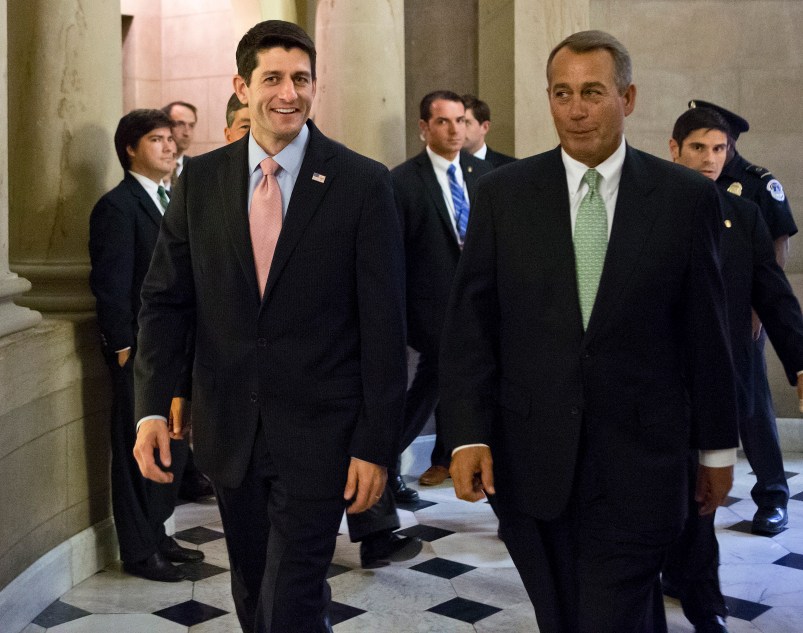The Republican-led House on Thursday passed a bipartisan budget deal aimed at mitigating painful spending cuts and avoiding more government shutdowns.
The vote was 332 to 94 with 169 Republicans and 163 Democrats voting for it.
The bill now goes to the Senate, where it is expected to pass, and subsequently be signed into law by President Barack Obama. If the bill becomes law, it would mark a major turning point after three years of paralyzing partisan disputes which culminated in the 16-day government shutdown last October. It means Congress would return to the normal budget process, if only for two years, rather than funding the government in incremental steps.
The modest deal, brokered by Rep. Paul Ryan (R-WI) and Sen. Patty Murray (D-WA), boosts discretionary spending from $967 billion to $1.012 trillion in 2014 and $1.014 trillion in 2015. It relieves $63 billion in across-the-board sequester cuts to defense and domestic programs, and is projected to lower the deficit over 10 years relative to current law.
The legislation offsets the spending increase with a mix of targeted cuts and non-tax revenue, such as higher airline ticket fees and higher federal worker contributions to retiree benefits. In order to satisfy each party’s core demands, the agreement does not raise any tax revenues or cut benefits from safety-net programs like Medicare and Social Security.
Surprisingly for some, House conservatives didn’t mount much of a rebellion. Ryan paved the way for the deal by pointing out that a continuing resolution at sequester levels lacked the votes to pass the House. GOP military hawks and appropriators, he told skeptical members, would have joined Democrats and voted against it. The budget deal was sold to the GOP conference as the most conservative plausible outcome in divided government.
The deal is Ryan’s first major bipartisan breakthrough that stands a chance of becoming law. While modest, the higher spending levels have drawn rebukes from hard line conservatives who often praise Ryan as a conservative hero. The House budget chief has struck a conciliatory tone while selling the plan, describing it as imperfect but an important step in the right direction. It’s a marked change in tone from his no-compromise posturing in President Barack Obama’s first term, when he pushed to subvert large tax-and-spending deals and preserve hopes for enacting his budget that slashes taxes and privatizes Medicare.
“That’s the nature of compromise. In a divided government you don’t get everything you want. But I think this bill is a firm step in the right direction. It’s not perfect, it’s a start,” Ryan said on the House floor. “It gives us the added benefit of preventing Washington from this lurch from crisis to crisis. We’re bringing stability to the budget process.”
If Republicans want to achieve all their budgetary goals, the Wisconsin congressman said, “we’re going to have to win some elections.”
Democrats weren’t thrilled with the agreement but reluctantly accepted it as an improvement on the status quo. They’re angry that it doesn’t extend emergency unemployment benefits, which are set to expire on Dec. 28; they believe it serves special interests by failing to unwind any tax loopholes for corporations; they dislike the effective pension cuts for federal workers.
House Minority Leader Nancy Pelosi (D-CA) reportedly urged Democrats to “embrace the suck” so that they could move forward. She told reporters that she while she doesn’t like the bill, it’s “an OK thing to vote for.”
Speaker John Boehner (R-OH) championed the budget deal and, in a shocking move, forcefully attacked conservative groups — such as FreedomWorks, Heritage Action and Club For Growth — who began voicing their opposition before it was officially announced.
“Frankly, I think they’re misleading their followers. I think they’re pushing our members in places where they don’t want to be. And frankly I just think they’ve lost all credibility. … There comes a point when people step over the line,” he told reporters on Thursday. One day earlier, during a press conference after a closed-door GOP meeting, he snapped at the same groups for “using” House Republicans to make money.
If and when the budget legislation becomes law, Congress has until Jan. 15 to flesh out and pass spending bills in order to avert a government shutdown.
Daniel Strauss contributed reporting.










